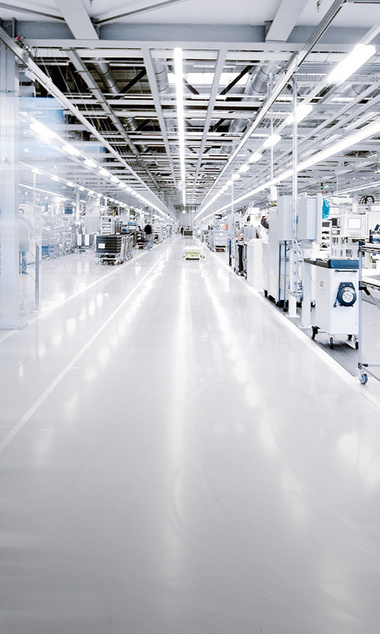
- Success Story
Efficient future: The Volkswagen Industrial Cloud
Volkswagen is paving the way for the factories of the future.
Together with Amazon Web Services, Siemens, MHP and other partners with a common goal: a more efficient value chain. Volkswagen is currently undertaking one of the largest transformation processes of recent decades. With numerous venerable marques, the car manufacturer is not only in the forefront of establishing electromobility on our streets – production and logistics within the group are also being transformed.
The goal: The factory of the future works in a data-driven way, predictively recognizing the sources of errors and defects and acting in a highly autonomous manner. The production network is extensively interlinked and enables rapid data exchange as well as agile guidance of the production network. The plan is to link the group plants to the cloud and develop numerous, easily scalable applications that can significantly enhance the effectiveness and efficiency of value creation.

Digital Production Platform as a basis
To realize this ambitious goal, in 2019 Volkswagen joined up with Amazon Web Services (AWS) and Siemens in the scope of the “Industrial Cloud” digitalization initiative. This strategic alliance is reinforced by further partners, with the aim of creating a comprehensive community for production companies in the future.
The group Digital Production Platform (DPP) is currently being established as framework and equipped with applications that can be used by all brands, so that the exchange of data across systems and assets is simplified. The DPP serves the partners as a basis for a significantly larger project: The Industrial Cloud also constitutes a platform that extends far beyond the boundaries of the group itself.
The long-term goal is for the Industrial Cloud to evolve into an open platform for the automobile and manufacturing industry, on which industrial IoT solutions can be exchanged, utilized and acquired.
Diverse and utilizable across the group
Volkswagen’s Industrial Cloud is intended to bring together the logistics and production data from the group’s plants throughout the world. The development of software solutions will be decentralized via this platform approach, with the result that use cases arise independently of one another throughout the entire production processes and supply chains. In this, standardized platform interfaces secure a common data infrastructure to enable analysis across factories and applications. The best aspect of this is the synergies that arise from using the platform: The solutions developed can be scaled into further group plants via the cloud – this applies to solutions developed both internally and externally.
MHP is supporting this project to link Volkswagen group production in essential areas: Alongside the establishment of projects and programs, we also enable the plants to utilize the internal Volkswagen platform by supporting technical and general onboarding. To achieve this, basic services are developed and provided in the form of blueprints and procedural models. These allow fast, smooth-running connectivity to the cloud.

We not only support the establishment of the group’s internal platform, ...
... as an Industrial Cloud community partner we also promote the interlinking of the entire automobile and manufacturing sector.
The development of production and logistics applications plays a decisive role when it comes to creating relevant added value – for both the group and the external market. Because: The Industrial Cloud also offers partners the opportunity to provide their own solutions in future, as well as aiming to make a comprehensive portfolio of proven industrial IoT solutions available to other companies.
The Industrial Cloud is intended to be opened to OEMs, subcontractors, technology providers, system integrators, independent software companies (ISVs) and logistics providers, who form an innovative community in which the open exchange of data and solutions is enabled.
Major impact for the overall transformation of the industry
With the linking of two of its plants to the Industrial Cloud Volkswagen has taken the first step towards making production and logistics more efficient and therefore sustainably increasing the competitiveness of the group. The innovative platform approach and the standardized infrastructure make it easy to launch, scale, maintain and update solutions.
With the opening of the Industrial Cloud in the external market it is possible for other companies in the industry to benefit from the solutions of the Volkswagen group and the insights and applications of third parties in the future.
Involvement with the platform is characterized by a desire for innovation and entrepreneurship. We at MHP share this vision 100 percent and will continue to contribute our ideas and innovative spirit to the project in the future, as strategic partner. Highly in keeping with our purpose: Enabling You To Shape A Better Tomorrow.

Here too, MHP is involved in a central role: As implementation partner for Industrial Cloud applications, we support Volkswagen from the group-internal development of applications to the provision of the applications on the Industrial Cloud marketplace and on to the development of own applications as ready-to-use software.
A good example of this is the Porsche Alarm Cockpit, in the development and realization of which we were heavily involved. This application enables the consolidation of different alarm signals from a range of IT systems with individual filtration in one application. We were also closely involved in the development of the Call Rocker application. The Call Rocker automates the replenishment of goods in SAP logistics systems. Both efficiency enhancing applications are already used effectively within the Volkswagen group and are intended to be made available to other OEMs in future via the Industrial Cloud marketplace. And these are just two of the many solutions.
MHP is therefore a central multiplier of the Industrial Cloud. Our support ranges from application development and product management and on to project governance and the go-to-market process.




